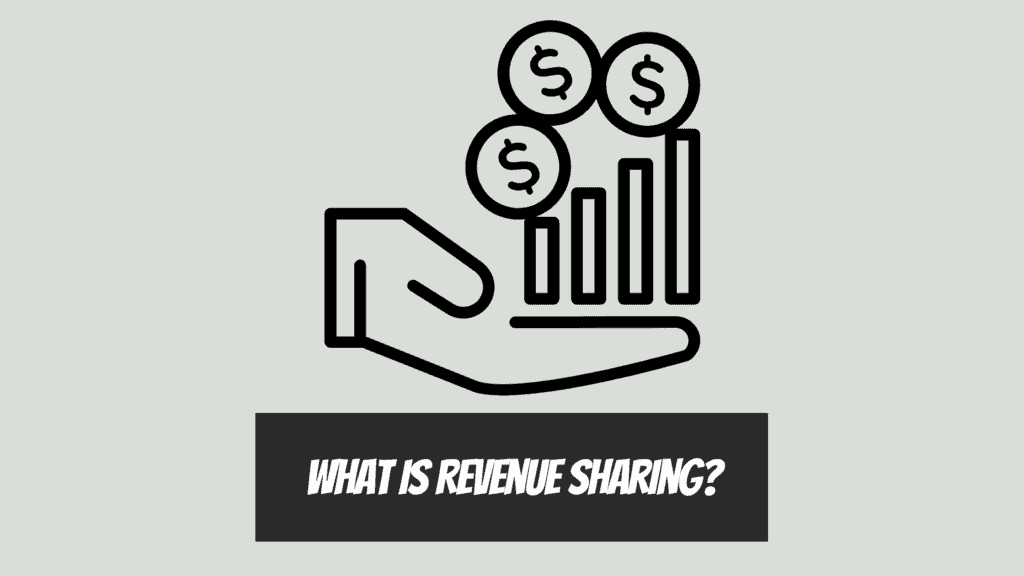In affiliate marketing, many types of relationships can be formed between an advertiser and a publisher.
The most common is the pay-per-sale model, where the affiliate is paid a commission on each sale that they generate.
However, there is another type of relationship that can be formed, which is known as revenue sharing.
In this blog post, I am going to explain revenue sharing or cost-per-action (CPA) in affiliate marketing.
What is Revenue Sharing in Affiliate Marketing?

In affiliate marketing, revenue sharing is a type of relationship that can be formed between an advertiser and a publisher.
In this type of arrangement, the affiliate is paid a commission based on the revenue that they generate for the advertiser.
This means that the affiliate only earns money if they can generate sales or leads for the advertiser.
How Does Revenue Sharing Work?
In revenue sharing, the affiliate is paid a commission based on the revenue that they generate for the advertiser.
This means that the affiliate only earns money if they can generate sales or leads for the advertiser.
For example, if an affiliate generates $100 worth of sales for an advertiser, they would earn a commission of $10.
Revenue sharing is different from other types of arrangements because it aligns the interests of both the affiliate and the advertiser.
With other arrangements, such as pay-per-sale, the affiliate only earns a commission if they can generate a sale.
This means that the affiliate has no incentive to generate leads that may not result in a sale.
With revenue sharing, the affiliate is still paid even if a lead does not result in a sale.
This means that the affiliate has an incentive to generate as many leads as possible, even if they are not all converted into sales.
The Advantages of The Revenue Sharing Model for An Affiliate Marketer
It Aligns the Interests of Both Parties
Revenue sharing is beneficial because it creates alignment between the interests of both the affiliate and the advertiser.
Other arrangements, such as pay-per-sale, only result in a commission for the affiliate if they can generate a sale. This means that the affiliate has no reason to generate leads that might not turn into a sale.
With revenue sharing, the affiliate is still paid even if a lead does not result in a sale. This means that the affiliate has an incentive to generate as many leads as possible, even if they are not all converted into sales.
It Encourages Lead Generation
Since affiliates are still paid for leads that don’t turn into sales, revenue sharing encourages affiliates to generate as many leads as possible.
This is beneficial for both the affiliate and the advertiser because it gives the affiliate more opportunities to generate a sale, and it gives the advertiser more opportunities to make a sale.
It Increases Transparency Between the Parties Involved:
Revenue sharing is also beneficial because it increases transparency between the parties involved.
In other words, with arrangements like pay-per-sale, the affiliate’s main concern might be generating sales while the advertiser is more concerned with generating leads.
With revenue sharing, both the affiliate and the advertiser are focused on generating revenue. This increases transparency because both parties know that they are working towards the same goal.
It Facilitates Communication Between the Parties Involved
Revenue sharing is also beneficial because it facilitates communication between the parties involved.
With other systems, like pay-per-sale, the affiliate and advertiser may have different goals.
The affiliate may be concerned with increasing sales, while the advertiser is more interested in producing leads.
This can lead to communication problems because the two parties are not working towards the same goal.
With revenue sharing, both parties are interested in generating revenue. This means that they are more likely to communicate effectively because they have the same goal.
It Creates a Win/Win Situation for All Involved
Revenue sharing is beneficial because it creates a win/win situation for all involved.
The affiliate is paid based on the revenue that they generate, so they have an incentive to generate as much revenue as possible.
The advertiser is also paid based on the revenue that the affiliate generates, so they have an incentive to find affiliates who are good at generating revenue.
This creates a win/win situation because both the affiliate and the advertiser are working towards the same goal.
Some of The Disadvantages of Revenue Sharing in Affiliate Marketing
It Requires More Work on the Part of the Affiliate
Revenue sharing is not as simple as other arrangements, such as pay-per-sale.
With revenue sharing, the affiliate has to track the revenue that they generate for the advertiser.
This means that the affiliate has to put in more work than they would with other arrangements.
It May Lead to Lower Quality Leads
Revenue sharing may lead to lower quality leads because the affiliate is paid for all leads, regardless of whether or not they turn into sales.
This means that the affiliate has no incentive to generate high-quality leads.
The Advertiser May Not Be Able to Make a Profit
Revenue sharing is beneficial for the affiliate, but it may not be beneficial for the advertiser.
The reason for this is that the advertiser is paid based on the revenue that the affiliate generates.
If the affiliate generates a lot of revenue, the advertiser will make a profit. However, if the affiliate does not generate much revenue, the advertiser may not make a profit.
It May Not Be Suitable for All Products and Services
Revenue sharing may not be suitable for all products and services.
For example, it would not be suitable for a product with a high price tag because the affiliate would need to generate a lot of sales to make a decent commission.
It May Not Be Suitable for All Advertisers
Revenue sharing may not be suitable for all advertisers. For example, it would not be suitable for an advertiser who is selling a product with a high price tag.
It May Not Be Suitable for All Affiliates
Revenue sharing may not be suitable for all affiliates. For example, it would not be suitable for an affiliate who is not good at generating sales.
Conclusion: Is Revenue Sharing Model Good For an Affiliate Marketer?

In my opinion, revenue sharing is a great model for an affiliate marketer. It allows the affiliate to generate revenue by simply referring customers to the advertiser, and it incentivizes the advertiser to find affiliates who are good at generating sales.
This creates a win/win situation for both parties involved. Additionally, revenue sharing is beneficial because it creates a transparent relationship between the affiliate and the advertiser.
They are both working towards the same goal, which leads to better communication between the two parties.
There are some disadvantages to revenue sharing, such as the fact that it requires more work on the part of the affiliate, and it may lead to lower quality leads.
However, I believe that these disadvantages are outweighed by the advantages.
Revenue sharing is a great way for an affiliate to generate income, and it is a beneficial arrangement for both parties involved.
Thank you for reading. I hope this article helped understand the revenue-sharing model in affiliate marketing.
If you have any questions, please feel free to contact me.
Sincerely,
Parthasarathi S.
